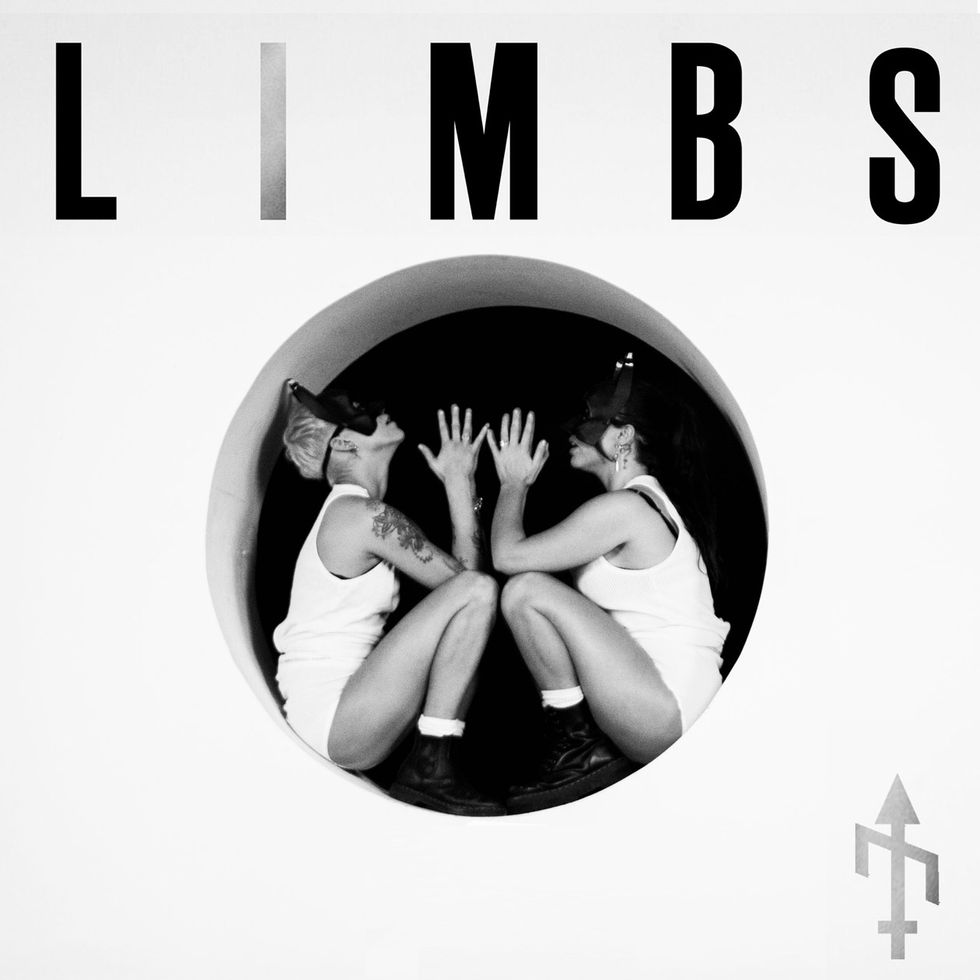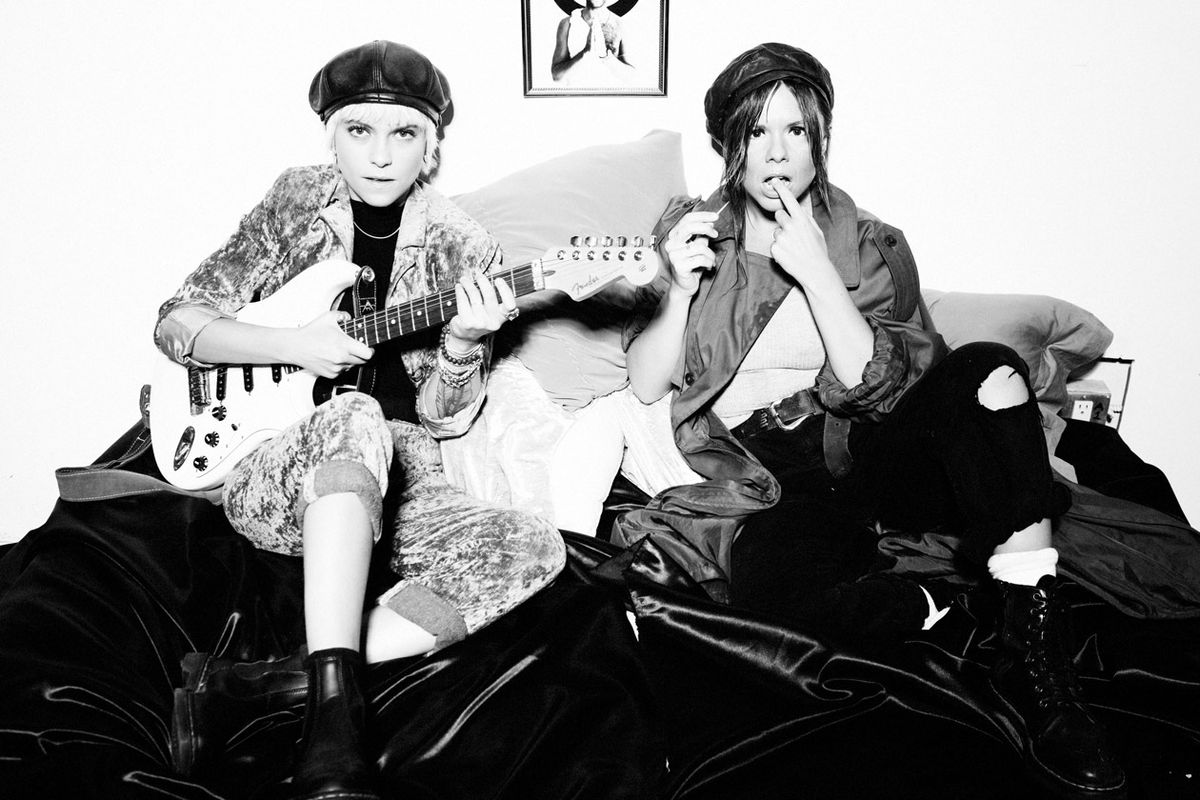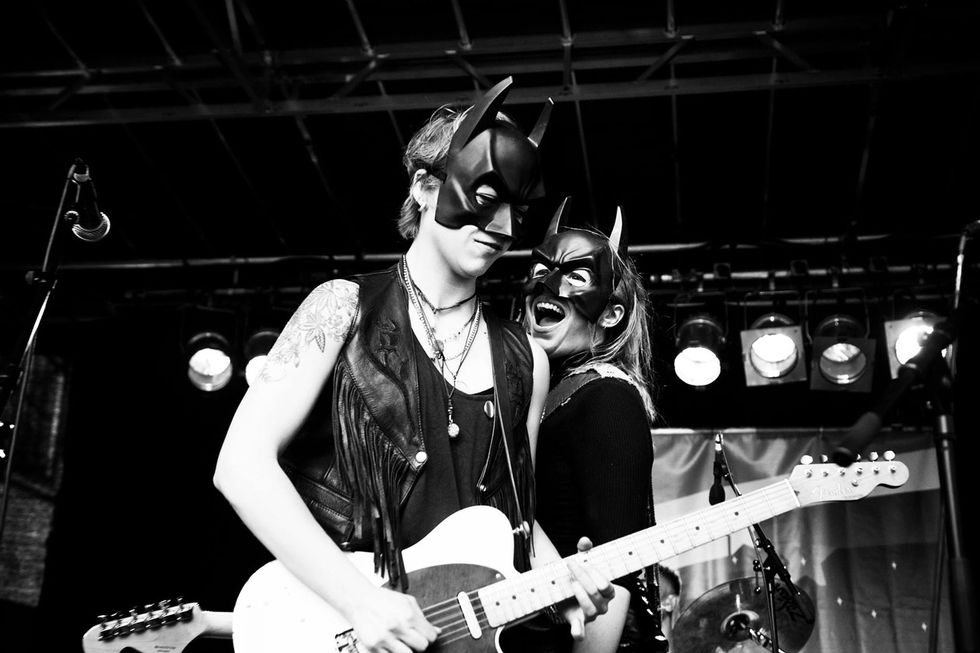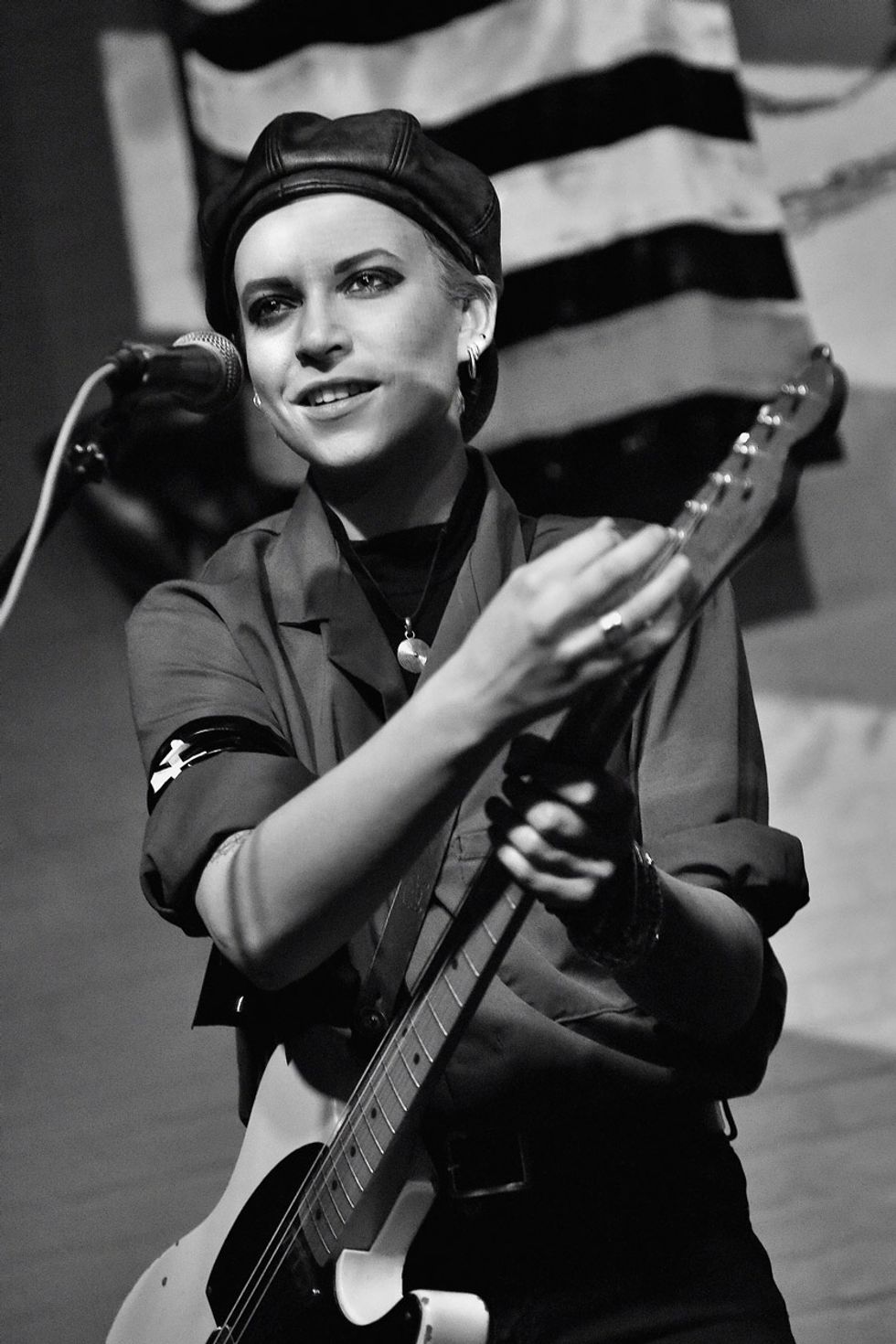An edgy 6-string neo-traditionalist uses classic Fender guitars to put the crunch in her own band, support a guitar legend, and stake out her mojo.
A few years ago, Carmen Vandenberg, a rock guitarist with a strong blues background, finished up a concert in London with vocalist Rosie Bones, her partner in the band BONES. It had been a killer performance, and a male concertgoer approached to tell the duo as much—with a caveat. He informed Vandenberg, implausibly, that her band would in fact always be inferior, since, having smaller hands, no woman could ever play guitar as skillfully as a man.
BONES’ response to this unfounded idea, a song and video called “Girls Can’t Play Guitar,” offers plenty of good evidence to the contrary. Vandenberg’s deft blues lines and powerful riffing reveal not just a fine guitar technique but a thorough study of the blues tradition—and a unique lens for viewing her influences, like Albert King and Muddy Waters.
Though she’s only in her mid 20s, Vandenberg already has an impressive resume. She trained at London’s Academy of Contemporary Music and established herself as a session guitarist. Onstage, she has backed up pop artists like Cher Lloyd and Kate Nash.
The depth of Vandenberg’s musicality—and the guitarist’s penchant for the blues—caught the attention of Jeff Beck, who asked BONES to cowrite his 2016 album, Loud Hailer, and to perform with him on tour. For the occasion, Vandenberg pulled off the mean feat of assimilating scores of songs from Beck’s 1970s catalog, accompanying him onstage in performances of classics like “Blue Wind” and “Freeway Jam.”
After having made a splash in their native U.K., Vandenberg and BONES recently moved to Los Angeles. They set up shop in a house and were in the process of writing new songs for an upcoming album when Vandenberg called to talk about the big move, working as a session guitarist, playing in BONES, and her cherished Fender guitars.
What inspired you to take up music?
I grew up in a rural town in Italy and started with the violin when I was 5 years old, because it was mandatory in school. I did the Suzuki method. I met Dave Stewart [best known for his work with Eurythmics] because his son was in my class, and we were like two naughty kids in the back of the classroom. We became friends, and then I saw his guitars and I just remember going back to my parents and saying, “I wanna do that. That’s what I’m gonna do in my life. I’m gonna play guitar.”
Then I started teaching myself. I would read from the violin parts on guitar and slowly learned to play. When I was a bit older, I started taking guitar lessons. It was that and a combination of my dad having a VHS cassette of Woodstock. Seeing Hendrix, I was like, “Daddy, can I be him?” That was one of those moments when my dad was like, “Oh shit.”
Early on, people tried to discourage me from becoming a professional guitarist, mainly because I was a girl, but I guess sometimes you’re a kid and you just set your mind to things—just try and do everything you can to make it happen.
What are some of the things you’ve done to make it happen?
Playing at home a lot as a kid. My parents recently said that I used to pretend to head off to sleep, but would instead go down into my room and play. I guess listening to a lot of blues albums—like, by Albert Collins, Albert King, and all the other Kings, really—lying on my bed and then picking up the guitar afterwards to see what I could remember.
And then, going out and trying to meet people. There’s always that thing of being at the right place at the right time, but you make your own luck by trying—trying in every kind of way. And sticking to the people that you really do want to work with, like the work relationship I have with my bandmates. We’re actually moving house today.
Thanks for squeezing in the interview, then. You’re in Los Angeles?
Yeah, we’re in L.A. and we literally just rented the van today. We’re packing up all the big bits.
That’s exciting. What made you decide to move to L.A. and how has it been treating you, musically speaking?
Well, we were in London for a while and we did BONES for, like, a year. Then we cowrote Jeff Beck’s album and went on tour with him for a year. So that took a chunk out of our year-and-a-half, which was an amazing experience: writing an album with such a lovely musician and being able to tour. But then we got back and we’d been in London for a long time.

As they build up to a debut album, Carmen Vandenberg and Rosie Bones have released a series of singles and videos. The latest is "LIMBS"—a slinky piece of electro-rock with a (very) brief appearance by Stevie Ray Vaughan and Albert King.
We saw a window of opportunity. We wanted to change location, start fresh, and hit a different market, because we’d toured Europe already. And we were like, “Fuck it—let’s just go to L.A.” So, we moved out here—without a house, without anything. We didn’t even know you needed a credit rating and shit like that to lease a house. We just kind of went on a whim, and we’re still trying to make it work. We’ve got management; everything’s going in the right direction. We’re just writing songs and doing support tours. It’s an exciting time.
Can you talk about music school and what you took from that experience?
I think with universities and music schools, you can learn as much from your teachers as you can from your fellow students. It’s all about being surrounded by so many like-minded people—people who are inspiring. I learned that the whole concept about music was about entertaining, sharing, making people happy—this kind of sense of being comrades within this music industry.
The lectures were good. You have to be able to take what you want from it. You can’t possibly absorb everything that they tell you in two years. You have to see what you want and make sure that things happen. You can easily just become a technically brilliant musician, but not know what opportunities are out there because you just stay at home.
Having fun was also part of it. I decided to do music because it’s something that makes me happy and can make other people happy. But you can’t take yourself too seriously through life; otherwise you’ll just die.
U.K. duo BONES has fun onstage, blending a hard-rock edge and blistering electronic beats with tongue-and-cheek humor. When a male concertgoer voiced his opinion that women are inferior musicians, they wrote a song about it.
What are some of the important things—technical or conceptual—that you took away from being a trained musician versus an autodidact?
I guess some of the stuff is hand technique. Also, training opens up your ears to what the other instruments are doing. You can see how non-guitarists approach their instruments and it gives you a wider perspective on music instead of only on your instrument.
Probably a lot of the scales they told me, I forgot, but a lot of the other information I retained and use without thinking about it. The mind is a bit of a sponge. We absorb what we need, and what we use daily on the guitar, and then reject what we don’t want.
I would happily go back and do a course, just to refresh my memory on all the things I learnt and forgot. I like structure. I had a really good time studying. I’ll probably do it again at some point, because, you know, you never cease to learn.
What are some things that you would like to learn about music that you haven’t yet?
I would like to do a bit more jazz, because I’d love to be able to sit in and play some standards, like I did when I was in my heavy period of studying music. But to be honest, I’m more on the other side of trying to develop my own sound and language. So really anything that inspires me will help me get there and enlarge my vocabulary.
Talk about your collaboration with Rosie Bones and what your working process is like.
We met in London at a blues bar, and a few weeks later we decided to be in a band together. We have different ways of writing music, but we like to sit together and bounce stuff off each other. But the thing is, she’s got an amazing work drive, which is inspiring. And also, in the band is our incredible producer, Filippo [Cimatti]. So, all three of us, or different combinations of us, get together to collaborate. We all live together and are always trying to stimulate fire in each other.
In BONES, you tend to blend these kind of earthy guitar tones with electronic beats.
Filippo does all these beats and we try to find something new within them. But it’s not contrived. I think the blues side comes out naturally from my playing. There’s not a conscious decision on my part to play something bluesy. I just can’t help it. The truth is, we’ve all got different tastes in music, and specific ideas about what we like and don’t like. The conglomeration of our styles is what makes our sound unique—though I hesitate to use that word for myself.
is that your boyfriend’s?’”
What guitars are you playing live and in the studio?
Well, my favorite guitar, my baby, is a reissue of a ’53 Tele. It’s the one I use mainly with BONES and everything else. I found it in a shop called No. Tom Vintage & Classic Guitars on Denmark Street in London, and I fell in love with it immediately. It’s my main guitar, and then I’ve got the Custom Shop Strat that Fender made me for the Jeff Beck tour. That’s my second baby.
What speaks to you about the Tele?
The Tele I have … I learned it works well with what we do with BONES, because it’s obviously got that brightness that cuts really well. If I do it properly with a good amp, like my Blackstar, I can get a tone that’s just got the strengths of a Tele, but doesn’t cut your ears off. That’s the sweet spot for me.
Did someone really tell you that girls can’t play guitar?
Yeah. It was at one of our shows a couple of years ago, and all of our male friends got angry with this guy, and we were like, “Just don’t worry about it. Let’s not create a fight.” The next day I got a phone call from Rosie, and she’s like, “I’ve got an idea for a song. We’re gonna do this track about girls can’t play guitar.” And the next day we just wrote it.

Guitars
Fender American Vintage 1953 Telecaster reissue
Fender Custom Shop Stratocaster
Amps
Blackstar Artist 30
Effects
Catalinbread Manx Loaghtan fuzz
Roger Mayer Mongoose Fuzz
Blackstar LT Drive
Strings and Picks
Ernie Ball strings (.010–.046)
Dunlop Nylon Standard .88 mm picks
Was that comment anomalous, or do you experience that sort of attitude regularly?
Oh yeah, all the time, all the time. I mean the amount of times Rosie and I will be walking to a venue on a tour, carrying our own gear … it can be quite insensitive. Someone will be like, “Whose guitar are you carrying—is that your boyfriend’s?” It happens all the time, sometimes under their breath, but then I think if they see us perform, most of the time, these commentators will come back and be apologetic.
How do you respond?
Sometimes you can get angry or be afraid, but then sometimes you’ve just got to shrug it off, you know, just get on with it. Obviously, it can affect you, but just don’t let it affect your performance.
It seems that channeling it into something creative is also a good strategy. On another note, what have you learned from session work?
Before we started BONES, it was the only real thing I was doing. It challenges you to be able to be versatile and adapt yourself to the person you’re playing with. Also, I think it teaches you to have a lack of ego.
I learnt a lot from session work—even just in terms of sound, you know. It’s not necessarily your sound that they need. You have to try and find out what is it they want. Maybe you can’t play your favorite guitar. You have to find one that’s got a tone that suits the song. So, it’s about being flexible—and being fucking on time and knowing your parts and shit.
“My favorite guitar, my baby, is a reissue of a ’53 Tele,” says Carmen Vandenberg. She got the guitar from No. Tom Vintage & Classic Guitars on Denmark Street in London. Photo by Eric Duvet
You’ve learned to search for sounds, but have you also needed to pick up new vocabulary?
Yeah, you learn a lot. There’s the voicing or progression you’ve never played before. And you learn just how much you need to practice to be on top of your game. Another cool thing is that what you learn through supporting artists will then enter in your own style of playing, so it makes you a more diverse musician on the whole.
So, what you’ve learned in session work has informed your work with BONES?
Definitely, definitely. Everything one person plays comes from some sort of inspiration of something else, so most of my vocabulary is an accumulation of my previous experiences or things I’ve listened to. You know, even when I play with Kate Nash or a pop act, even if it’s not my kind of of music, there’s something I’ve gotten from there that’s now under my fingers, even though I might not realize that it comes from one of those sessions.
How did you come to work with Jeff Beck and what was that like?
It was an amazing experience. It was a few summers ago that we [Vandenberg and Rosie Bones] were at a birthday party for [Queen drummer] Roger Taylor, and we met Beck. Then he came to a BONES show, loved it, and then asked us to write his album and go on tour. It all happened so quickly, the whole process.
Did you have to go learn some of his fusion tracks?
All of his repertoire.
That’s quite an accomplishment. Did you transcribe it yourself or work with existing notation?
I transcribed some of it. I went by ear, but didn’t really have time to do the proper scores. Jeff helped me out some, too, by explaining how he wanted certain things to sound. But mainly I learned the tunes just by listening to different versions on YouTube and figuring out how to make my own versions while making Jeff sound good.
What was it like to share the stage with Beck?
It was incredible. Sharing the stage with this legendary guitarist, one of the very best, I’d constantly be so blown away by what he was playing, and amazed to be right there with him. Sometimes I’d have to remind myself to stop being such a fan and keep on playing my parts!
Carmen Vandenberg channels her blues influences—and her own distinctive mojo—into this performance of “Girls Can’t Play Guitar,” summoning the spirits of Muddy Waters and Buddy Guy via her favorite: a Fender American Vintage 1953 Telecaster.



